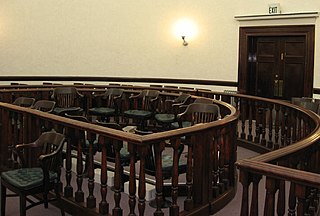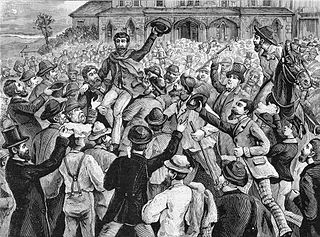
A jury trial, or trial by jury, is a legal proceeding in which a jury makes a decision or findings of fact. It is distinguished from a bench trial in which a judge or panel of judges makes all decisions.

A jury is a sworn body of people (jurors) convened to hear evidence, make findings of fact, and render an impartial verdict officially submitted to them by a court, or to set a penalty or judgment.

In common law jurisdictions, an acquittal means that the prosecution has failed to prove that the accused is guilty beyond a reasonable doubt of the charge presented. It certifies that the accused is free from the charge of an offense, as far as criminal law is concerned. The finality of an acquittal is dependent on the jurisdiction. In some countries, such as the United States, an acquittal prohibits the retrial of the accused for the same offense, even if new evidence surfaces that further implicates the accused. The effect of an acquittal on criminal proceedings is the same whether it results from a jury verdict or results from the operation of some other rule that discharges the accused. In other countries, like Australia and the UK, the prosecuting authority may appeal an acquittal similar to how a defendant may appeal a conviction — but usually only if new and compelling evidence comes to light or the accused has interfered with or intimidated a juror or witness.
Blakely v. Washington, 542 U.S. 296 (2004), held that, in the context of mandatory sentencing guidelines under state law, the Sixth Amendment right to a jury trial prohibited judges from enhancing criminal sentences based on facts other than those decided by the jury or admitted by the defendant. The landmark nature of the case was alluded to by Justice Sandra Day O'Connor, who characterized the decision as a "Number 10 earthquake".

R v Carroll (2002) 213 CLR 635; [2002] HCA 55 is a decision of the High Court of Australia which unanimously upheld the decision by a Queensland appellate court to stay an indictment for perjury as the indictment was found to controvert the respondent's earlier acquittal for murder. The court held that charging Raymond John Carroll with perjuring himself in the earlier murder trial by swearing he did not kill the baby Deidre Kennedy was tantamount to claiming he had committed the murder and was thus a contravention of the principles of double jeopardy. The case caused widespread public outcry and prompted calls for double jeopardy law reform.
Strauder v. West Virginia, 100 U.S. 303 (1880), was a landmark decision of the Supreme Court of the United States about racial discrimination and United States constitutional criminal procedure. Strauder was the first instance where the Supreme Court reversed a state court decision denying a defendant's motion to remove his criminal trial to federal court pursuant to Section 3 of the Civil Rights Act of 1866.

The Supreme Court of Queensland is the highest court in the Australian State of Queensland. It was formerly the Brisbane Supreme Court, in the colony of Queensland.

Dietrich v The Queen is a 1992 High Court of Australia constitutional case which established that a person accused of serious criminal charges must be granted an adjournment until appropriate legal representation is provided if they are unrepresented through no fault of their own and proceeding would result in the trial being unfair.

In England and Wales, a magistrates' court is a lower court which hears matters relating to summary offences and some triable either-way matters. Some civil law issues are also decided here, notably family proceedings. In 2010, there were 320 magistrates' courts in England and Wales; by 2020, a decade later, 164 of those had closed. The jurisdiction of magistrates' courts and rules governing them are set out in the Magistrates' Courts Act 1980.
David Harold Eastman is a former public servant from Canberra, Australia. In 1995, he was wrongfully convicted of the murder of Australian Federal Police Assistant Commissioner Colin Winchester and was sentenced to life imprisonment without parole. A 2014 judicial inquiry recommended the sentence be quashed and he should be pardoned. On 22 August of the same year, the Supreme Court of the Australian Capital Territory quashed the conviction, released Eastman from prison, and ordered a retrial.
Section 11 of the Canadian Charter of Rights and Freedoms is the section of the Canadian Constitution that protects a person's legal rights in criminal and penal matters. There are nine enumerated rights protected in section 11.

The judiciary of Norway is hierarchical with the Supreme Court at the apex. The conciliation boards only hear certain types of civil cases. The district courts are deemed to be the first instance of the Courts of Justice. Jury (high) courts are the second instance, and the Supreme Court is the third instance.

R v Thomas was an Australian court case decided in the Victorian Court of Appeal on 18 August 2006. It concerned the conviction in February 2006 of Joseph Thomas on terrorism-related charges, specifically receiving funds from Al Qaeda. The appeal revolved around the admissibility of a confession Thomas made during an interrogation in Pakistan in 2003. The court found that the evidence, which was crucial to Thomas' convictions, was inadmissible because it had not been given voluntarily. The court accordingly quashed his convictions, but after further hearings ordered on 20 December 2006 that he be retried rather than acquitted.
Cunningham v. California, 549 U.S. 270 (2007), is a decision by the Supreme Court of the United States in which the Court held, 6–3, that the sentencing standard set forward in Apprendi v. New Jersey (2000) applies to California's determinate sentencing law.

The court of assizes is the trial court which tries the most serious crimes in the judicial system of Belgium. It is the highest Belgian court with criminal jurisdiction; as such, it is the only Belgian court that can sentence someone to life imprisonment. The courts of assizes are not permanent courts; a new court of assizes is assembled for each new trial. There is a court of assizes in each of the ten provinces of Belgium, as well as one in the arrondissement of Brussels-Capital which is not part of any province. Further below, an overview is provided of the eleven courts of assizes and their seats. They are the only courts in Belgium for which the provinces are used as territorial subdivisions. They are also the only courts in Belgium that hold jury trials. The jury acts as sole trier of fact, but decides on the penalty together with the judges. The trial by jury of certain crimes is laid down in article 150 of the Belgian Constitution. The Belgian courts of assizes have the same origin as their French namesakes.
Racial discrimination in jury selection is specifically prohibited by law in many jurisdictions throughout the world. In the United States, it has been defined through a series of judicial decisions. However, juries composed solely of one racial group are legal in the United States and other countries. While the racial composition of juries is not dictated by law, racial discrimination in the selection of jurors is specifically prohibited. Depending on context, the phrases "all-white jury" or "all-black jury" can raise the expectation that deliberations may be unfair.

Williams v The Queen was a decision handed down by the High Court of Australia on 26 August 1987, concerning the common law right to personal liberty.

Hate speech laws in Canada include provisions in the federal Criminal Code, as well as statutory provisions relating to hate publications in three provinces and one territory.
John Harris Byrne is a retired Australian jurist who previously served as Senior Judge Administrator of the Supreme Court of Queensland. Having been a judge of that court since 1989, he was one of the court's most experienced judges. He was also Chair of the National Judicial College of Australia, a body which provides programs and professional development resources to judicial officers in Australia. He is now a private Commercial Arbitrator.

M v R or M v The Queen is an Australian legal case decided in the High Court. It is an important authority in the field of criminal law, for the circumstances in which it is permissible for a jury's guilty verdict to be overturned by a judge. The case involved an appeal against criminal conviction by a father, against allegations of sexual assault and rape by his daughter. His appeal was allowed by majority.










